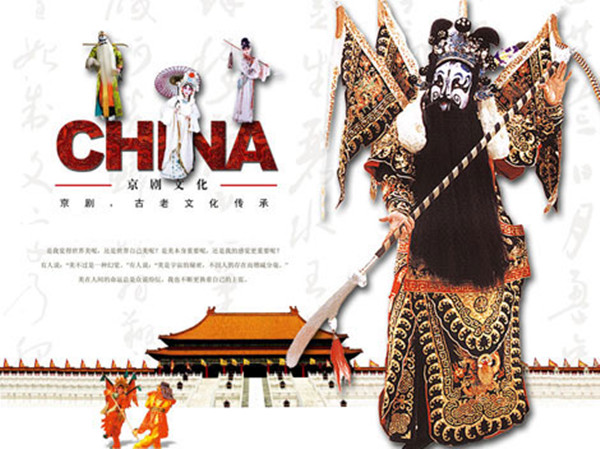
Inscribed on UNESCO's World Intangible Cultural Heritages List in 2010, Beijing Opera of China is a national treasure with a history of 200 years. As the most influential sort of traditional operas in China, Beijing Opera has a long history, following the Kunqu Opera (a class of tunes originating in Kunshan, Jiangsu). Since the fifty-fifth year (1791A.D.) of Emperor Qianlong's reign in the Qing Dynasty, the four major Anhui opera troupes who originally gave performances in South China entered successively into Beijing. They cooperated with actors from Hubei Province and accepted part of repertoires, tunes and performing methods of Kunqu opera and Qinqiang opera. In the meanwhile, they absorbed folk tunes in some regions and made continuous efforts in exchanges and assimilation. It is on this basis that they finally created Beijing Opera, which is the most influential type of opera with the most abundant repertoires and the largest number of actors, troupes and audience.
Beijing Opera provides a set of standardized art-expressing rules in various aspects such as literature, performance, music and stage design. Roles in Beijing Opera are classified into Sheng (young male character), Dan (young female character), Jing ("painted face" character), Chou (clown) and other roles in line with natural attributes of the characters. More frequently, they are classified in accordance with the characters' personalities and appraisals of the originator on them. A set of performance rules is prepared for every role, with unique features in singing, speaking, acting and martial arts. With historical stories as the main performance content, Beijing Opera is provided with a variety of widely-known repertoires including Blade of Cosmos, Magnolia Denudate, A Gathering of Heroes, Empty-City Stratagem and The Drunken Beauty. Beijing Opera is classified into "Beijing School" and "Shanghai School". There appeared a large number of excellent actors in different periods, with Mei Lanfang, Cheng Yanqiu, Xun Huisheng and Shang Xiaoyun known as the famous "Four Famous Drama Roles".
Widely spreading throughout China with extensive influence, Beijing Opera is dubbed as "Chinese Opera". It has reached all corners of the world as a crucial means of introducing and spreading traditional Chinese culture. Additionally, the multiple art elements contained within have served as the symbol of traditional Chinese culture.
Source: arts.cultural-china.com



